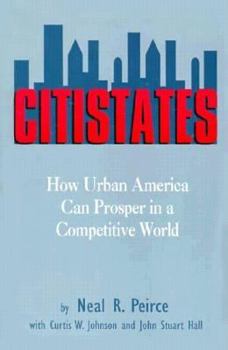Citistates: How Urban America Can Prosper in a Competitive World
Select Format
Select Condition 
Book Overview
"No one in the country knows as much as Neal Peirce about the ins and outs of American local government"Neal Peirce is the best writer on urban affairs in the country". -- Henry Cisneros, Secretary of... This description may be from another edition of this product.
Format:Hardcover
Language:English
ISBN:0929765168
ISBN13:9780929765167
Release Date:January 1993
Publisher:Seven Locks Press
Length:359 Pages
Weight:1.65 lbs.
Dimensions:1.1" x 5.9" x 8.9"
Customer Reviews
1 rating
Metropolitan regionalism gets seminal review
Published by Thriftbooks.com User , 24 years ago
As the world turns into a global entity, the United States has becomes a bona fide metropolitan nation. The 1990 census painted the picture of this accelerated pace of urbanization in striking numerical colors: Slightly more than 50 percent of us live in the 39 U.S. metropolitan areas with populations of more than a million people. By contrast,the mid-20th century census uncovered only 30 percent of the U.S. population living in 14 metro areas with million-plus populations. But citistate realities don't just apply to the larger regions -- the New Yorks, Los Angeles, Chicagos, Bostons of America, the Berlins, Londons, Hong Kongs, Shanghais of the globe. All metropolitan regions face stiff competition and challenges. Include the United States' metro regions under 1 million people and the count exceeds 80 percent of the nation's people. To put a human face on this fast-paced urbanization, three members of the Citistates Group -- Neal Peirce, Curtis Johnson and John Stuart Hall-- coined the new term "citistates." In their words, citistates are "not just the center city, but the entire metropolitan region - the 'real city' made up of center city, inner and outer suburbs, and rural hinterland so clearly and intimately interconnected in geography, environment, work force, and surely a shared economic and social future." The transformation is apparent across the Atlantic, where Europeans have begun to describe their continent as a hodgepodge of powerful citistates -- from Manchester to Stuttgart, Lyon to London, Milan to Marseilles. Like U.S. citistates, these metropolitan regions are making economic and cultural transactions with little regard to their own nation-state governments. The Citistates Group associates see a shift in thinking from the familiar governmental paradigm -- federal-state-local -- to one focused on function: global-regional-neighborhood.* Global because critical issues have worldwide implications -- global warming, economic restructuring, rapid global market repercussions. * Regional because the metropolitan areas, or citistates, share areawide transportation systems, media outlets, medical assistance, goods, services, even crime. Peirce argues that the success of the regional system -- on every measure from workforce preparedness to the quality of the infrastructure -- determines how competitive and successful the citistate will be for all its citizens in the long run. * Neighborhood because it is on the personal, community level that escalating U.S. social problems can ultimately be dealt with. Citistates includes six case studies based on Peirce Reports for the leading newspapers in Phoenix, Seattle, Baltimore, Dallas, St. Paul and Owensboro, Ky. These popularly written analyses examine each region's special problems and suggest potential solutions tailored to the local situation. The goal in each series is to identify ways out of a region's dilemmas by tapping civic





